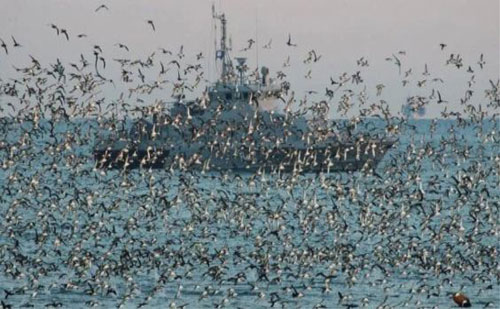NV: Let’s discuss in more detail those lawsuits against various people in Crimea who attended anti-war rallies. We have various reports that there are allegedly some people in Crimea in the Armed Forces, allegedly some prosecutors and FSB members, who are not happy with the course of developments, the course of the war. How would you describe the current mood in Crimea?
It’s rather difficult to tell, to give any estimations for all of Crimea, as in Crimea the moods of the various population groups vary widely. There are Crimean Tatars who have been politically disloyal to Russia from the beginning and have tried to defend their freedoms peacefully. Now, of course, they are under even more pressure and repression. There are citizens that are simply afraid that hostilities will spread to the Crimean territory — no matter what the consequences will be, they are simply afraid of war. In general, this is probably the most common mood. Let me remind you that Russian propaganda, in particular the narrative that Crimea was captured without a fight without casualties, although this is not the case, it used it very widely in an attempt to spread its influence and somehow regain the sympathy of the Crimean people.
Read also: Ukraine’s General Staff says hospitals in Crimea have stopped admitting civilians to free up beds for wounded soldiers
As for the departure of security officers, FSB officers and law enforcement officers to Russian regions, the departure from the Crimea, I would not saythat this is a large-scale or mass process. I’m afraid that this is our desire rather than reality. Although some part of the population did genuinely leave — we can’t say that no one was scared. Quite a lot of those who most likely understand that they are there (those who came from Russia), violating Ukrainian law. And if the situation pans out in such a way that Crimea is eventually returned, they will generally have to somehow resolve problems with the property they bought, with education, in general, try to either legitimize themselves, or still leave. And some part at the very beginning of the full-scale invasion really did go; we have observed this.
NV: I also saw on your website, it was at the beginning of the war, that there was a hospital in Krasnoperekopsk that was overcrowded with the wounded. We have reports that there are many Crimean hospitals with wounded Russian military. Do you know anything about this?
In general, as you know, and now it is no secret that for the Russian troops the southern axis and the offensive from the Crimea was probably the most successful. However, a huge number of victims, fatalities and wounded came to Crimea. We’re just now beginning to learn more or less,but there is a huge mass of dead Russian soldiers from the 810th, for example, the Russian Marine Brigade, based in Sevastopol. They also took part (in the fighting in Ukraine), we had data, we received information from there, absolutely verified, it is certain that more than 70 people refused to take part in hostilities. This was the beginning of the full-scale invasion, that is, before the wave of casualties, which then began to depart Ukraine. I think that now the situation is perhaps even more critical for the military, who do not want to take part in hostilities against Ukraine.
Read also: Russia deploys more troops from Crimea to Ukraine’s Zaporizhzhya Oblast
In general, as you know, and now it is no secret that for the Russian troops the southern axis and the offensive from the Crimea was probably the most successful. However, a huge number of victims, fatalities and wounded came to Crimea. We’re just now beginning to learn more or less,but there is a huge mass of dead Russian soldiers from the 810th, for example, the Russian Marine Brigade, based in Sevastopol. They also took part (in the fighting in Ukraine), we had data, we received information from there, absolutely verified, it is certain that more than 70 people refused to take part in hostilities. This was the beginning of the full-scale invasion, that is, before the wave of casualties, which then began to depart Ukraine. I think that now the situation is perhaps even more critical for the military, who do not want to take part in hostilities against Ukraine.
NV: Then let’s talk about the cases we have in Crimea. I read on your website that the latest case is that 25-year-old Aziz Fayzulayev was detained on suspicion of setting fire to the Pushkine village administration building in the Sovietsky district. In the evening of the same day, a video appeared of him confessing that he had done so in protest at the war. What is happening to Aziz and how common are such cases?
I would not go so far as to say that this is a sort of guerrilla movement, organized or at least large-scale, no. But the number of people and the presence of people who are ready to oppose the war physically, not just writing some posts on Facebook… Yesterday, for example, we did not even have time to write it up, one of the activists in Simferopol was fined 30,000 rubles ($520) just for writing “No to War” on her VKontakte page in April, and that sufficed. There are a lot of them, and this is genuinely such a large-scale anti-war movement, but of peaceful resistance. But there are people — new ones are constantly appearing — who are ready to oppose the war, to take some more visible, physical steps. There is an artist in Yevpatoria who tried to set fire to the administration building, recorded anti-war videos, did things in general, anti-war protests. And here in Pushkine, and a few other people who were fined for going out to protest, we also covered this.—Agencies








